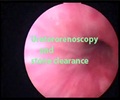The oil extracted from Cannabidiol (CBD) present in cannabis (marijuana) does not lower pain scores after common treatment for urinary stones.

Is Cannabidiol (CBD) Oil Effective for Pain Control After Urinary Stone Treatment?
Urinary stones located in the kidney or ureter are one of the most common problems treated by urologists. Stones that are too large to pass on their own may be treated surgically, using an instrument called a ureteroscope to remove or fragment the stones. In most cases, a soft plastic tube called a stent is placed to ensure that urine can drain from the kidney into the bladder until the swelling of the ureter resolves. Many patients find the stent uncomfortable and painful, leading to the need for pain medications – often including opioids.TOP INSIGHT
Pain felt after ureteroscopy and stent placement is similar between the group of patients who received Cannabidiol (CBD) Oil and opioid drugs.
To assess its effectiveness, a new study included 90 patients, average age of 64 years, undergoing URS and stent placement for urinary stones. Patients were randomly assigned to three days of treatment with oral CBD oil or an inactive placebo. Treatment consisted of "off-label" use of a CBD oil formulation approved by the US Food and Drug Administration for the treatment of certain types of seizure disorders.
No Reduction in Pain or Opioid Use with Cannabidiol (CBD) Oil
Both groups received other standard medications, including a "rescue" opioid if needed for severe pain. A brief mild period of dizziness was the only side effect in patients taking CBD oil.Pain scores after URS and stent placement were similar between groups. With CBD or placebo, the average maximum pain score immediately after treatment was 2.2 (on a 0-to-10 scale). In both groups, pain scores decreased over the first three days. At no time were pain scores more than one-half a point difference between the CBD and placebo groups.
Hence, this study provides high-quality evidence to counsel patients in this situation: While CBD oil appears safe, it does not seem to reduce pain or discomfort during the typically brief recovery period after this common procedure.
 MEDINDIA
MEDINDIA




 Email
Email









